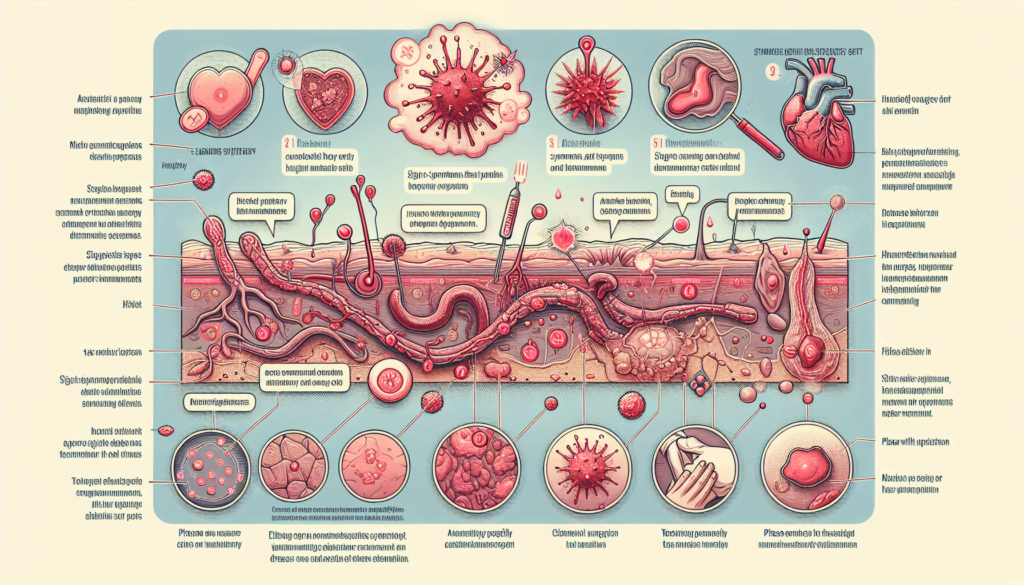Imagine waking up one morning to discover an unusual rash or blisters on your skin. Your immediate thought may be, “What is this?” Perhaps you suspect it could be something serious, like herpes. But what do the first stages of herpes actually look like? In this article, we will explore the visual signs and symptoms of the initial stages of herpes, helping you gain a better understanding of what to look out for and how to seek proper medical attention. So, let’s unravel the mystery and shed some light on this common viral infection that affects millions of people worldwide.


Primary Herpes Infection
Overview
The primary herpes infection refers to the initial outbreak of the herpes virus in an individual who has never been infected before. It occurs when the virus is transmitted through direct skin-to-skin contact with an infected person. During this stage, the virus enters the body and travels along the nerves to establish a lifelong infection. It is important to note that herpes is a common viral infection that affects millions of individuals worldwide.
Symptoms
The symptoms of a primary herpes infection can vary from person to person. In many cases, individuals may not even realize they are infected as the symptoms can be mild or go unnoticed. However, some common signs to watch out for include flu-like symptoms such as fever, fatigue, muscle aches, and swollen glands. Soon after, sores or blisters may appear on the affected area, such as the genitals, mouth, or rectum. These painful lesions may take a few weeks to heal. It is crucial to seek medical attention if you suspect you have a primary herpes infection, especially if you are experiencing severe symptoms.
Lesions and Sores
During a primary herpes infection, the appearance of lesions and sores is a characteristic feature. These sores may be red and fluid-filled, and they can break open and crust over as the infection progresses. The lesions can be painful, causing discomfort and irritation. It is important to keep the affected area clean and dry to prevent secondary infections. Avoid touching the sores and practice good hygiene by washing your hands regularly. Additionally, it is important to note that the virus can be transmitted to others through direct contact with the sores, so it is vital to take precautions to prevent spreading the infection.
Recurrent Herpes Infection
Overview
After the primary infection, the herpes virus remains dormant in the body and can reactivate periodically, leading to recurrent herpes infections. These episodes can occur spontaneously or due to certain trigger factors. Recurrent herpes infections tend to be less severe and shorter in duration compared to the primary infection.
Symptoms
The symptoms of recurrent herpes infections are often similar to those experienced during the primary infection. However, they tend to be milder and may last for a shorter period. Common symptoms include tingling or itching in the affected area, followed by the appearance of small clusters of fluid-filled blisters. These blisters may break open, form a crust, and eventually heal. While the symptoms may be less severe, it is important to note that the virus can still be transmitted during a recurrent outbreak.
Trigger Factors
Various factors can trigger a recurrence of herpes infections. These triggers vary from person to person and can include prolonged exposure to sunlight, physical or emotional stress, hormonal changes, illness or weakened immune system, and certain medications. By identifying and avoiding these trigger factors, individuals can reduce the frequency and severity of recurrent outbreaks.
Differences Between Primary and Recurrent Infections
Appearance
The appearance of primary and recurrent herpes infections can be different. During the primary infection, the lesions and sores are typically more extensive and widespread. They may be larger and more painful compared to the lesions observed during recurrent outbreaks. Additionally, primary infections tend to involve multiple sites, while recurrent infections often occur in the same or nearby areas.
Severity
Primary herpes infections are generally more severe compared to recurrent infections. The initial outbreak may cause flu-like symptoms and intense pain, making it necessary for medical attention. Recurrent outbreaks, on the other hand, are usually milder and may not require medical intervention.
Duration
Primary herpes infections typically last longer compared to recurrent infections. The initial outbreak can persist for two to three weeks or even longer, while recurrent outbreaks tend to resolve within a week or so. However, it is important to note that these timelines can vary between individuals.


Genital Herpes vs. Oral Herpes
Primary Infection
Both genital herpes and oral herpes can present with primary infections. Genital herpes is generally transmitted through sexual contact, while oral herpes is commonly transmitted through oral-to-oral contact. The primary infection for genital herpes typically occurs in the genital area, leading to the development of sores or blisters. In contrast, the primary infection for oral herpes occurs on or around the mouth and lips.
Symptoms
The symptoms of primary infections differ between genital and oral herpes. In genital herpes, individuals may experience pain, itching, and blisters in the genital area. The blisters can progress to painful sores, which may be accompanied by flu-like symptoms. In oral herpes, commonly known as cold sores or fever blisters, individuals may experience tingling or burning sensations around the mouth, followed by the development of fluid-filled blisters. These blisters can be painful and may cause discomfort while eating or talking.
Transmission
Both genital and oral herpes can be transmitted to others during active outbreaks. Genital herpes is primarily transmitted through sexual contact, while oral herpes can be transmitted through direct contact with the mouth or sharing items such as utensils, lip balm, or towels. It is important to practice safe sex and avoid direct contact with open sores or blisters to prevent the spread of herpes.
How Herpes is Diagnosed
Medical History
When diagnosing herpes, a healthcare provider will typically start by gathering your medical history. They will ask about any previous symptoms, sexual history, recent exposure to the virus, and any risk factors that may be relevant. Providing accurate information will help the healthcare provider determine if further testing is necessary.
Physical Examination
A physical examination can be crucial in diagnosing herpes. During the examination, your healthcare provider will examine the affected areas for any visible signs of the infection, such as sores or blisters. They may also check for any enlarged lymph nodes in the surrounding area.
Lab Tests
Lab tests are often utilized to confirm a herpes diagnosis. These tests can include viral culture, polymerase chain reaction (PCR) tests, or blood tests. A viral culture involves collecting a sample from a sore or blister and examining it in a laboratory to detect the presence of the herpes virus. PCR tests detect the genetic material of the virus and can provide accurate results even if there are no visible symptoms. Blood tests can check for the presence of antibodies to the herpes virus, which can indicate a current or past infection.
Treatment Options for Herpes
Antiviral Medications
Antiviral medications are commonly prescribed to manage herpes infections. These medications can help reduce the severity and duration of outbreaks, as well as lower the risk of transmission to others. They work by inhibiting the replication of the virus. It is important to start antiviral therapy as soon as symptoms appear or as directed by a healthcare professional.
Pain Management
Pain management is an essential aspect of herpes treatment. Over-the-counter pain relievers, such as acetaminophen or ibuprofen, can help alleviate discomfort and reduce inflammation. Topical numbing creams or ointments may also provide relief. Additionally, applying cool compresses or taking warm baths can help soothe the affected area.
Home Remedies
Several home remedies can aid in managing herpes outbreaks. These include keeping the affected area clean and dry, avoiding tight clothing or synthetic fabrics that may irritate the skin, and practicing good hygiene. Additionally, applying cold compresses or taking oatmeal baths can provide relief from itching and inflammation. It is important to note that while home remedies can offer some relief, they do not replace medical treatment or antiviral medications.

Prevention and Transmission
Safe Sexual Practices
Practicing safe sex is essential in preventing the transmission of genital herpes. Using latex condoms or dental dams during sexual activity can significantly reduce the risk of infection. It is important to note that condoms may not cover all affected areas, so it is crucial to avoid sexual contact during active outbreaks. Regular testing for sexually transmitted infections (STIs) and open communication with sexual partners can also help prevent the spread of herpes.
Avoiding Direct Contact
To prevent the transmission of oral herpes, it is important to avoid direct contact with the mouth during active outbreaks. Refrain from sharing personal items such as lip balm, utensils, or towels with individuals who have active cold sores or fever blisters. Practicing good personal hygiene and washing hands regularly can also reduce the risk of transmission.
Vaccination
Currently, there is no cure for herpes, but vaccines are being developed to prevent the spread of the virus. Vaccination can potentially help reduce the risk of acquiring or transmitting genital herpes. It is important to consult with a healthcare professional to understand the available vaccination options and determine if they are suitable for you.
Possible Complications
Spread to Other Body Parts
In rare cases, the herpes virus can spread to other areas of the body, leading to complications. This can occur when the virus enters small breaks in the skin or mucous membranes. If the virus spreads to the eyes, it can cause a condition known as herpes keratitis, which can result in vision impairment or blindness if left untreated. If you suspect the virus has spread to other body parts, it is crucial to seek immediate medical attention.
Increased Risk of HIV
Herpes infection can increase the risk of acquiring or transmitting the human immunodeficiency virus (HIV). The presence of herpes sores can provide entry points for HIV, making it easier for the virus to enter the body. It is important for individuals with herpes to take necessary precautions to prevent HIV transmission, such as practicing safe sex and regularly testing for STIs.
Psychological Impact
The psychological impact of herpes should not be underestimated. The diagnosis of herpes can be emotionally distressing, leading to feelings of shame, guilt, or anxiety. It is essential to seek support from healthcare professionals, support groups, or therapists who can provide guidance and help manage the emotional impact of the infection.
Managing Herpes Outbreaks
Hygiene Practices
Maintaining good hygiene is crucial in managing herpes outbreaks. It is important to keep the affected area clean and dry to prevent secondary infections. Avoid touching the sores and wash your hands regularly to minimize the risk of spreading the virus. Additionally, wearing loose-fitting clothing made of natural fibers can prevent irritation and promote healing.
Avoiding Triggers
Identifying and avoiding trigger factors can help manage recurrent outbreaks. These triggers can vary between individuals but may include stress, exposure to sunlight, hormonal changes, or certain foods. By understanding your personal triggers, you can take proactive steps to minimize the frequency and severity of outbreaks.
Supportive Care
During outbreaks, practicing self-care and seeking support are important. This can involve managing stress through relaxation techniques, getting enough sleep, eating a healthy diet, and engaging in physical activity. Additionally, reaching out to healthcare professionals, support groups, or loved ones can provide emotional support and alleviate any concerns or anxieties.
When to Seek Medical Attention
Persistent or Severe Symptoms
If you experience persistent or severe symptoms of herpes, it is important to seek medical attention. This includes symptoms that do not improve with self-care measures or over-the-counter medications. Your healthcare provider can assess the severity of your symptoms, provide appropriate treatment, and offer guidance on managing the infection.
Frequent Outbreaks
If you are experiencing frequent herpes outbreaks that significantly impact your quality of life, it is advisable to consult with a healthcare professional. They can evaluate your condition, identify potential triggers, and recommend appropriate treatment options to help manage your symptoms and reduce the frequency of outbreaks.
Concerns about Transmission
If you have concerns about transmitting herpes to others, it is important to discuss these concerns with a healthcare professional. They can provide guidance on safe sexual practices, reliable methods of transmission prevention, and offer support to address any anxieties or uncertainties you may have.
In conclusion, understanding the different stages, symptoms, and management strategies is crucial in effectively dealing with herpes infections. By following preventive measures, seeking timely medical attention, and taking necessary precautions, individuals with herpes can lead healthy and fulfilling lives. Remember, you are not alone, and there is support available for anyone affected by the herpes infection. Stay informed, be proactive, and reach out for the care you deserve.



